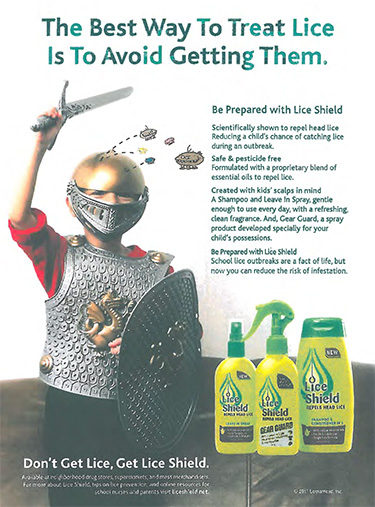By: Linda L. Goodman
On September 16th, the Federal Trade Commission (“FTC”) charged Lornamead, Inc. with deceiving consumers with exaggerated claims that its “Lice Shield” shampoo, stick, and spray products would prevent or reduce the risk of getting head lice. On the same date, an agreed-upon settlement was posted in which Lornamead will pay a $500,000.00 fine and be prohibited from making further deceptive lice-prevention claims. It marketed its product line of Lice Shield, claiming that its products containing citronella and other essential oils, which would “dramatically reduce” the risk of head lice infestations. These claims were made in print ads, website and banner ads, as well as on the product packaging. The company further claimed THAT Lice Shield products WERE “scientifically shown to repel head lice.” In truth, they did not possess or rely upon a reasonable basis that substantiated these representations. There were no scientific tests which proved that, when used as directed, Lice Shield product significantly reduced the likelihood or change of head lice infestation.

“As any parent knows, an outbreak of lice can wreak havoc,” said Jessica Rich, Director of the FTC’s Bureau of Consumer Protection. “When marketers say their products can be used to avoid these pests, they’d better make sure they can back up their claims.”
Most importantly, the proposed order requires Lornamead to have at least one well-controlled human clinical study supporting its claims that Lice Shield products and other drugs, cosmetics or pesticides it markets will shield consumers from pediculosis; reduce the risk of an infestation by a specific percentage or amount; repel all lice; or repel a specific percentage or amount of lice. For any other claims it makes about repelling lice or reducing the risk of infestation, and for claims it makes about the health benefits of any drug, cosmetic, or pesticide, the company is required to have competent and reliable scientific evidence. Clinical testing of the product is becoming the standard by which all advertising will be examined by the FTC.
This article is a publication of The Goodman Law Firm and is intended to provide information on recent legal developments. It is not intended to be and should not be relied on as legal advice for any particular matter. This article does not create an attorney-client relationship, nor should it be construed as legal advice or an opinion on specific situations. This may constitute “Attorney Advertising” under the Rules of Professional Conduct and under the law of other jurisdictions.
Linda L. Goodman is an attorney specializing in internet compliance and privacy law. With years of experience helping businesses navigate complex legal landscapes, Linda contributes expert insights on compliance issues in the digital space. To learn more about her services and insights, visit her law firm website at The Goodman Law Firm.
© 2014 TGLF, A.P.C.
